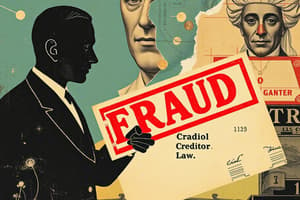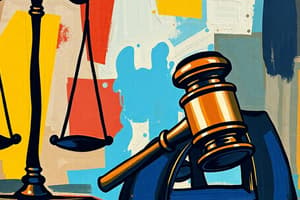Podcast
Questions and Answers
What is the primary modus operandi of fraud as defined in the lecture?
What is the primary modus operandi of fraud as defined in the lecture?
What is one example of fraud by failing to disclose information?
What is one example of fraud by failing to disclose information?
According to the lecture, what distinguishes cyber-dependent frauds from cyber-enabled frauds?
According to the lecture, what distinguishes cyber-dependent frauds from cyber-enabled frauds?
What implications does the Economic Crime and Corporate Transparency Act 2023 hold for business owners?
What implications does the Economic Crime and Corporate Transparency Act 2023 hold for business owners?
Signup and view all the answers
How has the internet influenced the prevalence of fraud?
How has the internet influenced the prevalence of fraud?
Signup and view all the answers
What is the maximum amount of compensation for customers tricked into sending money to fraudsters as of October 2024?
What is the maximum amount of compensation for customers tricked into sending money to fraudsters as of October 2024?
Signup and view all the answers
Which of the following is NOT a mechanism of fraud outlined in Cialdini's Psychology of Persuasion?
Which of the following is NOT a mechanism of fraud outlined in Cialdini's Psychology of Persuasion?
Signup and view all the answers
Under the new PSR regulations, which type of payment required compulsory compensation before October 2024?
Under the new PSR regulations, which type of payment required compulsory compensation before October 2024?
Signup and view all the answers
What does the 'central route' refer to in the Elaboration Likelihood Model?
What does the 'central route' refer to in the Elaboration Likelihood Model?
Signup and view all the answers
Which of the following techniques involves providing a lower initial offer followed by a higher request?
Which of the following techniques involves providing a lower initial offer followed by a higher request?
Signup and view all the answers
What is a key outcome of the authority principle in the psychology of persuasion?
What is a key outcome of the authority principle in the psychology of persuasion?
Signup and view all the answers
Which of the following strategies might fraudsters employ to create a sense of trust?
Which of the following strategies might fraudsters employ to create a sense of trust?
Signup and view all the answers
Which statement reflects a common misconception about bank reimbursements for fraud victims?
Which statement reflects a common misconception about bank reimbursements for fraud victims?
Signup and view all the answers
What psychological impacts can fraud victims experience?
What psychological impacts can fraud victims experience?
Signup and view all the answers
Which of the following statements about victim blaming is true?
Which of the following statements about victim blaming is true?
Signup and view all the answers
How do the stereotypes of fraud victims often misrepresent them?
How do the stereotypes of fraud victims often misrepresent them?
Signup and view all the answers
What is a significant consequence of victim blaming in fraud cases?
What is a significant consequence of victim blaming in fraud cases?
Signup and view all the answers
Which of the following statements accurately describes the relationship between banks and fraud?
Which of the following statements accurately describes the relationship between banks and fraud?
Signup and view all the answers
What community perception contributes to fraud victims' experiences of embarrassment?
What community perception contributes to fraud victims' experiences of embarrassment?
Signup and view all the answers
What extreme impact can fraud have on victims, although it is rare?
What extreme impact can fraud have on victims, although it is rare?
Signup and view all the answers
Signup and view all the answers
Signup and view all the answers
Study Notes
Fraud Lecture Notes
- Fraud is defined as any crime using deception as its main method. It's about gaining financial advantage or causing loss through deception.
- Fraud can result in financial gain for someone, but it doesn't always cause a financial loss for another party.
- The Fraud Act 2006 outlines different fraud types: false representation, failing to disclose information, and abuse of position.
- Fraudsters may also create or possess items for fraudulent use, participate in fraudulent businesses, or obtain services dishonestly.
- The Economic Crime and Corporate Transparency Act 2023 introduces responsibilities for preventing fraud within businesses.
- Fraud has a diverse range of victims (individuals, companies, governments).
- Fraud perpetrators also encompass a variety of individuals (employees, organized crime groups, or companies).
- Fraud is a global problem, with high prevalence in some areas, and its causes and effects are multifaceted.
- Cyber-dependent frauds require computer technology to exist while cyber-enabled ones existed before but are easier due to technology advancements.
- Fraud is often a transnational phenomenon.
- Increased fraud damages are seen as a growing trend, and the global financial impact is substantial.
- Fraudsters use a range of strategies like manipulating people's emotions or using technology to conceal their actions.
- Victims often experience emotional distress, financial hardship, and damage to relationships.
- Victim blaming is a problematic issue, as neoliberal ideals often place blame on victims.
- Victims may experience different levels of harm, and banks sometimes shoulder the responsibility for financial loss.
- Fraudsters can use tactics to manipulate victims, like the "rejection-then-retreat" technique or exploiting perceived expertise.
- The scale of fraud incidents can be very high, both reported incidents and their financial values.
- Individuals engaging in fraud may use various strategies or rationalizations for their acts.
- "Strain theory" suggests that individuals may commit fraud due to blocked economic or social goals.
- "Routine activity theory" posits that fraud happens when the opportunity, motivation, and skills converge.
- Fraud has links to human trafficking and other organized crimes, often employing similar tactics and affecting vulnerable populations.
- Individuals, including employees and organised crime groups, can perpetrate fraud.
- Various factors (stress, opportunity) can drive fraudulent actions at the individual and corporate level.
- Fraud occurs across different demographics, industries, and geographies.
Fraud Types
- Identity fraud, Insurance fraud, Mass-marketing fraud, Banking fraud
- Chief executive fraud, Expenses fraud, Payroll fraud, Tax fraud, Social security fraud, Grant fraud, Advance payment fraud, Business email compromise, Investment fraud, Consumer fraud, Procurement fraud, Romance fraud, Nigerian 419 scams
- Card Not Present fraud, Phishing scams, Mass Marketing Frauds, Romance Fraud. Cyber-enabled frauds, Cyber-dependent frauds.
Fraud Mechanisms
- The "Fraud Triangle"
- Differential association
- Strain theory
- Routine activity theory
- Persuasive communication mechanisms
- Motivations for committing fraud
Studying That Suits You
Use AI to generate personalized quizzes and flashcards to suit your learning preferences.
Related Documents
Description
This quiz covers the fundamental concepts of fraud, including its definitions and types as outlined in the Fraud Act 2006. It also discusses the Economic Crime and Corporate Transparency Act 2023, highlighting the responsibilities businesses have in preventing fraud. Explore the diverse range of victims and perpetrators, and gain insights into the global impact of fraudulent activities.




